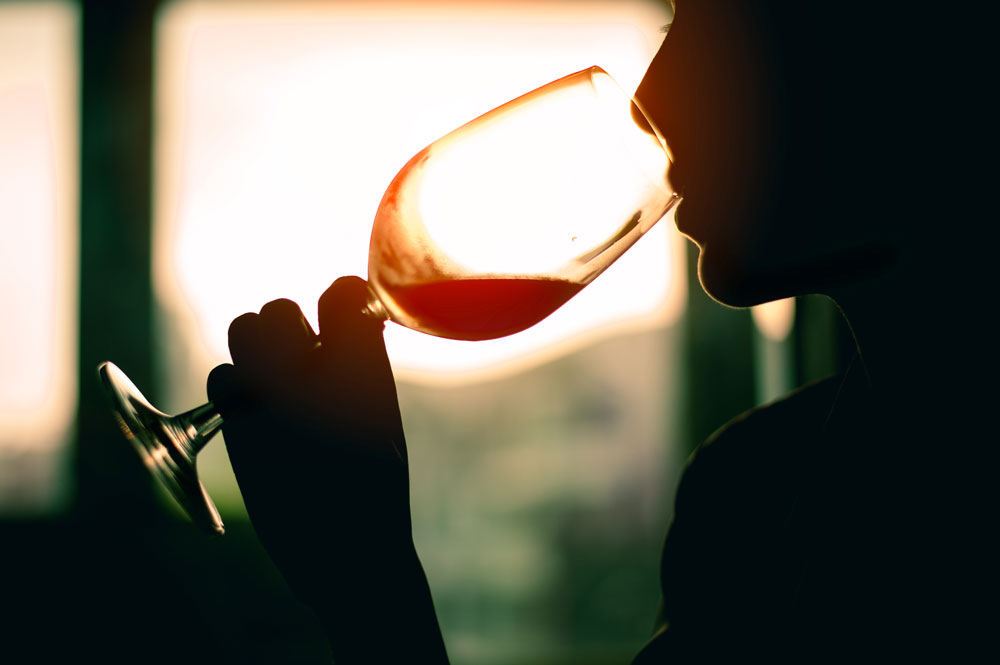Have you ever observed a professional wine tasting and wondered why everyone is so noisy? Loud slurping and gurgling sounds may seem out of place in an otherwise civilized atmosphere, so what are they all about? Read on to discover the purpose behind the ruckus.
Oxygen
 Wine changes over time and under different conditions. This may seem like an obvious statement, but it’s less true for other beverages. Bourbon, for example, doesn’t change from the time it’s bottled until it’s opened. In fact, the only significant change to an open bottle of whiskey comes from the slow evaporation of alcohol and water. Wine changes in its aromas, flavors, colors, and textures over time. One of the primary drivers of this change is oxygen, which makes wine seem softer and more open in small amounts, but, in excess, will cause oxidation and spoil the wine. Oxygen also makes wine more aromatic or stronger smelling for a short time. That’s one of the reasons both for decanting wine and swirling it in a glass. When a sommelier slurps wine, they are drawing air into their mouth and through the liquid, which intensifies the flavors and aromas they’re evaluating. Think of it like audio volume – a music critic can better evaluate the subtlety of sound when the volume is turned up.
Wine changes over time and under different conditions. This may seem like an obvious statement, but it’s less true for other beverages. Bourbon, for example, doesn’t change from the time it’s bottled until it’s opened. In fact, the only significant change to an open bottle of whiskey comes from the slow evaporation of alcohol and water. Wine changes in its aromas, flavors, colors, and textures over time. One of the primary drivers of this change is oxygen, which makes wine seem softer and more open in small amounts, but, in excess, will cause oxidation and spoil the wine. Oxygen also makes wine more aromatic or stronger smelling for a short time. That’s one of the reasons both for decanting wine and swirling it in a glass. When a sommelier slurps wine, they are drawing air into their mouth and through the liquid, which intensifies the flavors and aromas they’re evaluating. Think of it like audio volume – a music critic can better evaluate the subtlety of sound when the volume is turned up.
Taste Through Your Nose
 Most people think that we smell with our nose and taste with our tongue, but it’s more complicated than that. In reality, our nose is involved both before and after we take a sip of wine. If you’ve ever tried wine while suffering from a cold, you’ll understand what I mean. Wine tastes muted and boring when your sense of smell is impaired. When we take a sniff from the glass, we are inhaling aromas from the wine through the front of our nose and into our nasal cavity. When the wine is in our mouth, those same aromas enter the nasal cavity but from the other direction – through our sinuses. Drawing air into our mouths helps to pull those scents through the liquid and into our noses, thereby allowing us to smell the wine better.
Most people think that we smell with our nose and taste with our tongue, but it’s more complicated than that. In reality, our nose is involved both before and after we take a sip of wine. If you’ve ever tried wine while suffering from a cold, you’ll understand what I mean. Wine tastes muted and boring when your sense of smell is impaired. When we take a sniff from the glass, we are inhaling aromas from the wine through the front of our nose and into our nasal cavity. When the wine is in our mouth, those same aromas enter the nasal cavity but from the other direction – through our sinuses. Drawing air into our mouths helps to pull those scents through the liquid and into our noses, thereby allowing us to smell the wine better.
Practice
If you’d like to learn the noisy but delightful practice of wine slurping, start by holding a small amount of air in your mouth without any liquid. Then, try blowing a tiny amount of air out of your pursed lips as carefully as possible. The smaller the volume of air, the better. After you’ve practiced this for a while, try reversing the direction of airflow, drawing in instead of blowing out. Once you feel comfortable, try taking a sip of water and drawing tiny amounts of air through it. Only after you feel good with water should you graduate to wine – wine stains are more difficult to remove, after all. See for yourself whether wine tastes better and stronger with a little extra air and enjoy your new membership in the Club of Noisy Wine Tasters.




Thanks for finally writing about >Why Do Sommeliers Slurp Their Wine?
– From The Vine <Liked it!
I use slurping when eating hot liquids also, it helps to cool them down. I didn’t know about doing it with wine so I’ll be doing that when trying new wines from now on.
Try it and let us know if it differs your experience! We’d love to have some feedback on this tip!
I try to avoid eating with any person who does this. I prefer not to be around people who sound like disgusting, ill animals when they choose to damage their livers.
We totally understand! Most only do this during tastings and not meals. =]